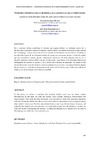Please use this identifier to cite or link to this item:
https://accedacris.ulpgc.es/handle/10553/58696
| Title: | Turismo y reservas de la biosfera: El caso de Canarias orientales | Other Titles: | Tourism and biosphere reserves: The case of eastern Canary islands | Authors: | Morales, Alejandro González Hernández Luis, José Ángel |
UNESCO Clasification: | 531290 Economía sectorial: turismo | Keywords: | Reserva Biosfera Canarias Orientales Sol y Playa Evolución Turística Sostenibilidad, et al |
Issue Date: | 2011 | Journal: | Tourism & Management Studies | Abstract: | En el presente trabajo abordamos la afección que supone declarar un territorio reserva de la biosfera para su posterior desarrollo turístico. Nuestro ámbito de estudio constituye la parte oriental del Archipiélago Canario, esto es las islas de Lanzarote, Fuerteventura y Gran Canaria. El trabajo se ha elaborado a partir de un exhaustivo trabajo de campo con numerosas visitas al ámbito de estudio que nos permitieron aportar algunas valoraciones cualitativas de estos espacios reservas de la biosfera; también se han acudido a fuentes documentales y por último se ha obtenido información bibliográfica de Canarias en general, y de la reserva de la biosfera en particular. En definitiva este trabajo demuestra como los turismos complementarios al sol y la playa han aprovechado las figuras de protección, en particular la denominación de reserva de la biosfera, para poder desarrollarse de forma conveniente aunque no de manera sostenible. In this paper, we declare a condition that involves biosphere reserve area for future tourism development. In this paper we study the Eastern Canary Islands (Lanzarote, Fuerteventura and Gran Canaria). This work has been developed from an extensive work with numerous interviews with the affected population that allows us to make qualitative assessments of many people living in these biosphere reserves areas. We have also obtained information from diverse Canary literature, and especially the biosphere reserve. In summary, this work demonstrates how the alternative tourism has taken the figures of protecting the territory, including the designation of biosphere reserve in order to developing a convenient but not sustainable way. |
URI: | https://accedacris.ulpgc.es/handle/10553/58696 | ISSN: | 2182-8466 | Source: | Tourism & Management Studies [ISSN 2182-8466] (1), p. 947-959 | URL: | http://dialnet.unirioja.es/servlet/articulo?codigo=5018521 |
| Appears in Collections: | Artículos |
Page view(s)
131
checked on Nov 1, 2024
Download(s)
76
checked on Nov 1, 2024
Google ScholarTM
Check
Share
Export metadata
Items in accedaCRIS are protected by copyright, with all rights reserved, unless otherwise indicated.
